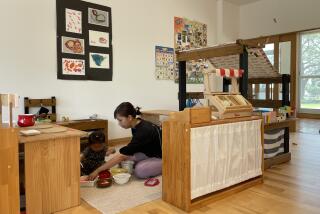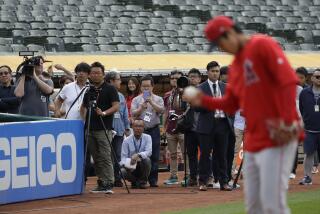Winning Smiles
NAGANO, Japan — You saw them everywhere here, wearing their two-tone gray recyclable uniforms and 1,000-watt smiles, the Nagano volunteers. They are the young and not-quite-young people who handled a thousand tasks in helping Olympic events get done and visitors get where they wanted to go.
Among all that goes with these all-but-over Olympics, theirs might have been the toughest, and least understood, job here. For in Japan, it has not been cool to volunteer.
“It is changing among the younger people, especially since the Kobe earthquake three years ago [when thousands stepped forward to help], but among the older people, there is no understanding of ‘volunteer,’ ” Katsutoshi Enokida said. “Older people here believe they must be paid for their work.”
But since there hasn’t been a recent Olympics that wasn’t carried on the backs of some kind of volunteer labor, it was imperative that a volunteer force be trained and ready here.
So the call went out, from the Nagano Organizing Committee and from major Japanese companies. And, surprisingly, 30,000 people responded.
That, of course, left the problem of what to do with them.
Which is where Enokida came in. The director of the center for international exchange programs at Aichi Shukutoku University in Aichi, he was asked to write a training manual for the volunteers, and to assist in getting them ready for the deluge of gaijin, foreigners.
And write it he did, complete with diagrams of how to smile--a pleasant greeting smile, a warmer glad-to-see-you version, and the 1,000-watt “Wow! Am I glad you’re here!” beamer.
There were other, more practical things as well, perhaps most important, helping the volunteers to develop a sense of individualism.
“In Japan, most people are not individuals,” Enokida said. “Our culture is more group-oriented. But for the volunteers, there is not time for a conference. Each person has to decide for himself [when a visitor starts asking questions].”
Enokida was chosen because of his field of study and his overseas experiences. He and some of his students have been frequent visitors to international studies programs in Washington, and when volunteer training sessions began around the country, his students were among the first instructors.
Apparently, everything took, for if there have been problems with these Games, there have been few with the ever-cheerful, ever-helpful volunteers.
They came here from around Japan for nothing more than food, housing and transportation. Some were on paid leave from their companies, some were on vacation, some were here simply for the experience. And for both visitors and volunteers, the experience has been a good one.
More to Read
Go beyond the scoreboard
Get the latest on L.A.'s teams in the daily Sports Report newsletter.
You may occasionally receive promotional content from the Los Angeles Times.






